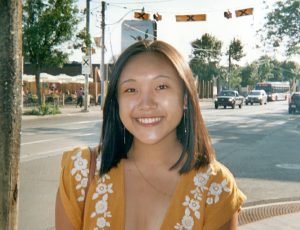Advice for Prospective Students from the Incoming Class
October 1/2022
By Françoise Makanda
New students share their excitement about joining the DLSPH community — and their advice for those about to undergo the application process.
Show Why You Care About Public Health
“While your CV is valuable, focus on showing why public health is important to you specifically! Really try to convey your passion for public health in your statement of interest. Discuss practical ways that you will integrate past experiences and the skills you gain through your DLSPH degree and emphasize how you hope to make meaningful public health change in the future. Best of luck!” – Abby Taher
“First of all, I believe it is important to know yourself before writing your letter of intention: what are your values in life, why did you choose your career path and what do you plan on achieving for the future. Like you would do for a job interview, it might be useful to do a tablesheet or a Word document with the skills the program wants their students to have, with examples of where and when you have learned those skills, or how do you think your studies would help you to learn it. Every minute you spend on getting to know yourself better will help you to write a meaningful letter. Remember that this is the first thing the admissions committee will look at, and they want to feel connected to you and your goals. They want to see concrete examples of how and why you would be a good fit. It is also important to read a lot about the program, and search for former students and what they are doing now.” – Bruna Dos Santos
“One thing that I would advise prospective students looking to apply to the health promotion MPH is to emphasize why Dalla Lana is for you, what you look to learn from the school and how that can help you in your future. Be sure to indicate any collaborative specializations or faculty you are interested in working with!” – Pooja Dey
“One tip I would provide prospective students to include or do to include in their application is to create a detailed list of why this program stands out to them.” – Danica Fitzsimmons
“As someone who was not successful gaining acceptance to master’s programs the first time around, being accepted this time to all my programs I applied for, there is one reason why I think mine stood out. Be specific in your goals and interests. General aspirations may not capture the attention of an admissions committee. They knew that I was hoping to become a bioethicist, but specify how this degree will enable you to achieve your unique goals in your career. For instance, I expressed how I would hope to address the prescribing practices of narcotic medications in family medicine, as opposed to saying “I’d like to address gaps in healthcare”. Even if you do not have a great amount of experience and the highest grades, presenting yourself as passionate and informed is greatly important.” – Sam Moshiri
Do Your Research
“While there is no standard formula for creating a perfect application, there are a few things that you can check off prior to submitting your application to markedly increase your chance of success. On the top of my list is to do your research; don’t overlook the importance of taking ample time to learn about the University and the graduate program of interest, including but not limited to: some University/program history, philosophies, and core values. By familiarizing yourself with the University and graduate program, you increase your ability to create an application that connects/relates your unique experiences, values, and philosophies to those of the University and program. Highlighting this connection shows the Admissions Committee why you specifically are a strong fit for the program and how you can immediately bring value to the school.” – Flora Zhang
Speak to Your Experience
“Take some time to reflect on your past academic, volunteer and work experiences to get a better understanding of which moments brought you the most fulfilment and continued curiosity. Doing so will allow you to recognize, appreciate, and confidently speak to the knowledge and skills gained thus far in your careers, making your application sound more authentic and natural, while also providing you more of a direction in terms of finding which path you may want to take in your field.” – Isabella Rodriguez
“It is important to start your application early and do your research on the program you’re interested in, for example, the program’s values, visions, and philosophies and even how to submit your application. Starting early gives you the time to research, reflect on yourself and ask yourself questions on “why am I interested in this program?”, and “what experiences do I have will be of value to this program?” Therefore, do your best to reflect on your education, values, and volunteer and work experiences because these are aspects that make you who you are today! They also want to see your personality and values embedded within your application as a way to gain perspective on what kind of student you are along with your experiences and so on. More importantly, be proud of them! Do not compare yourself with others because it can discourage you and lower your self-confidence, which may negatively impact the quality of your application. Each of you have relevant and unique experiences that you can include in your application. You are a qualified candidate and that’s how you should view yourself!” – Yurico Li
“What I would tell prospective students to do is to take the time to reflect on their passions and interests, especially when it comes time to explore different work and volunteer opportunities. This ensures that the opportunities align with both their values and career goals. I knew I wanted to pursue a career in nutrition and food, so I kept that in mind when looking for both work and volunteer opportunities throughout my undergraduate degree. In turn, I gained experience working in several nutrition-related fields such as dietetics, food service, and nutrition research. Another piece of advice I have for the application process is to leverage the resources provided by their academic institution. I highly recommend attending career seminars or booking one-on-one career advising sessions provided by the student career centers. They provide invaluable insights that may help students improve their resume writing, letter of intent writing, and interview skills.” – Cathy Chu
“Be your most authentic self. Think of your application as the advertisement you are using to sell yourself to the school of your choice. In a process where admissions committees are reading thousands of applications, it is easiest for those that are written with wholehearted authenticity to stand out. I would encourage anyone applying to first ensure that the program you are applying to is in an area that you are passionate about and then let that passion guide how you complete your application and tell your authentic story.” – Aaliyah Hinds
If You’re in the MPH in Nutrition and Dietetics…
“Another side note, I think students should also include in their application are the Integrated Competencies for Dietetic Education and Practice, paraphrasing and tying them into their past experiences in a way that demonstrates their dietetic learnings and qualifications thus far. As these are the competencies necessary to ultimately become a Registered Dietitian, it is important that they are emphasized throughout the application process.” Isabella Rodriguez
The admissions team is always happy to answer your question. Visit the frequently asked questions on the student page.

